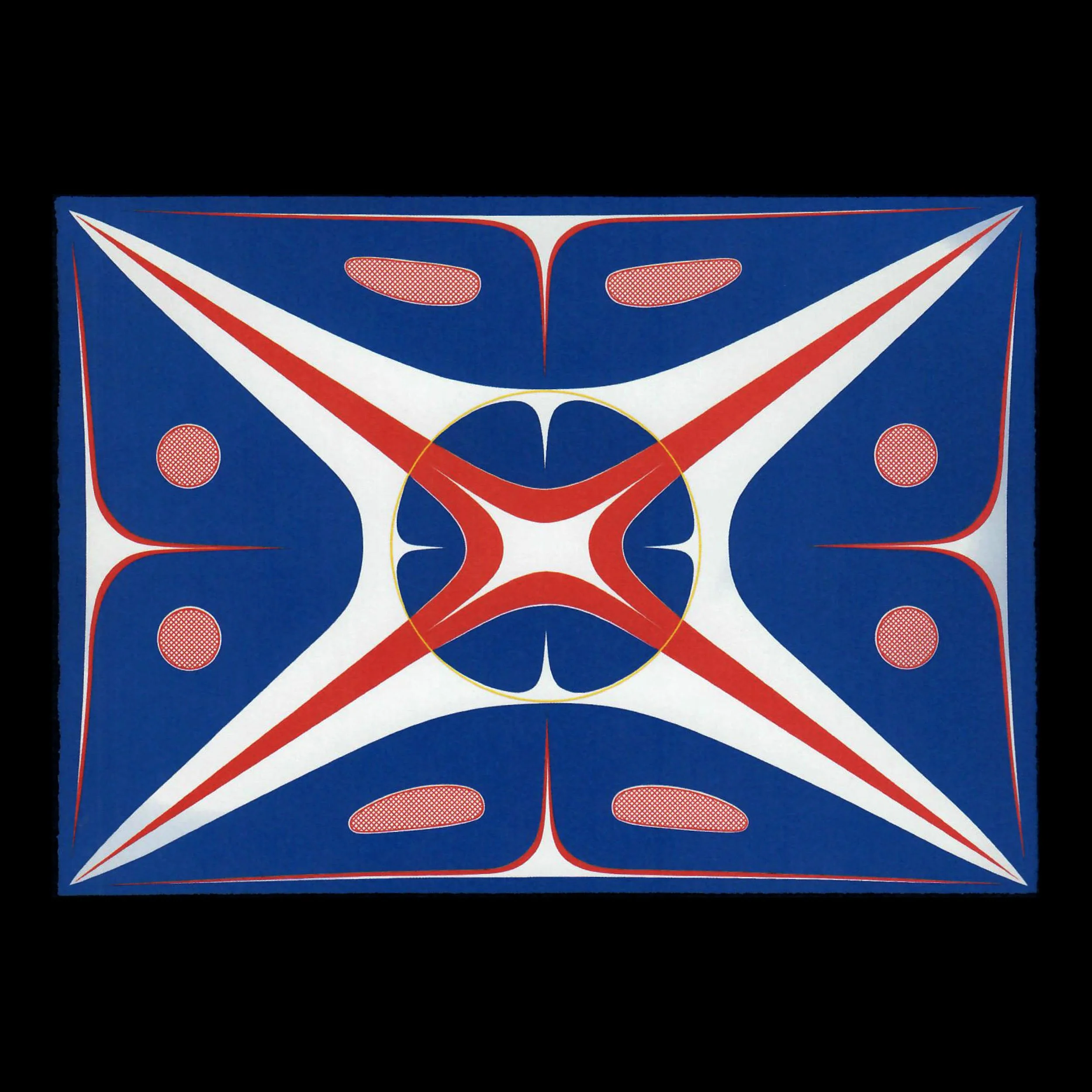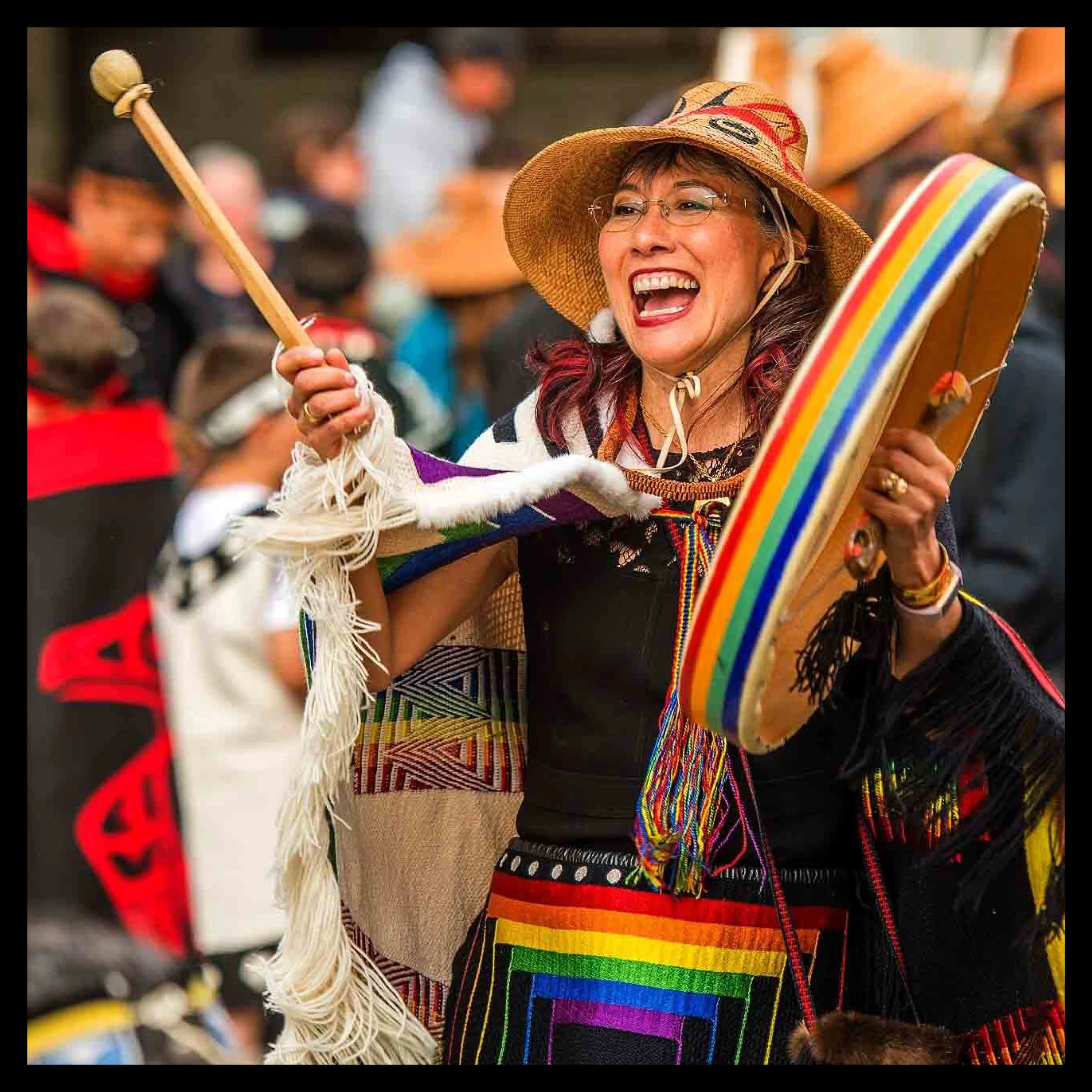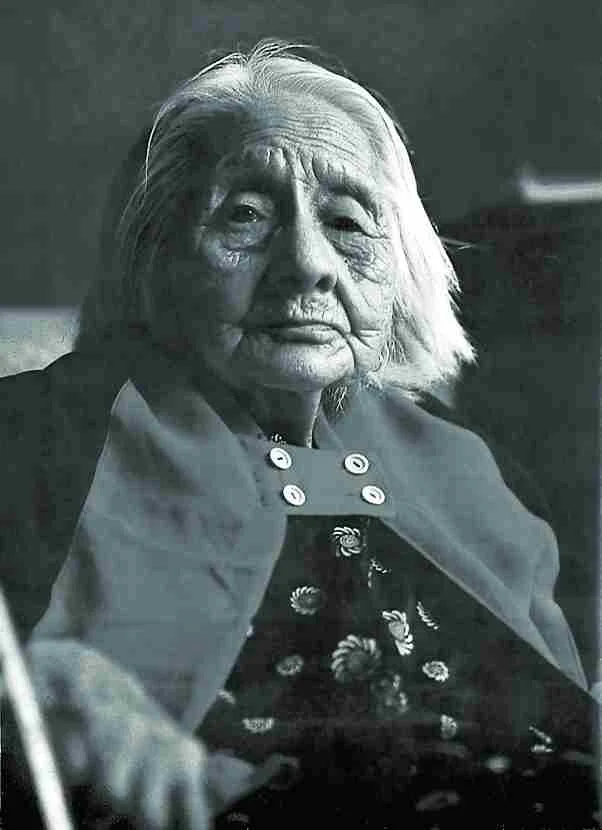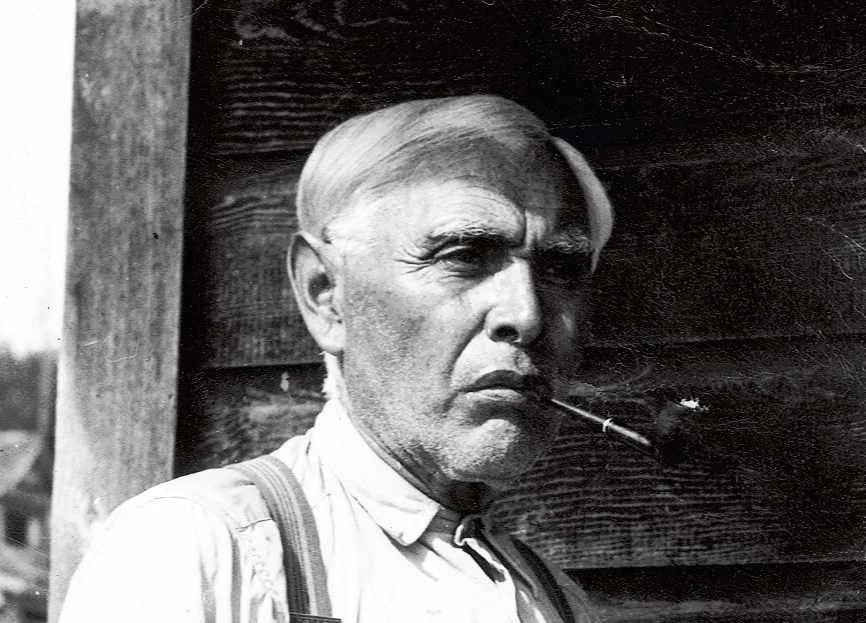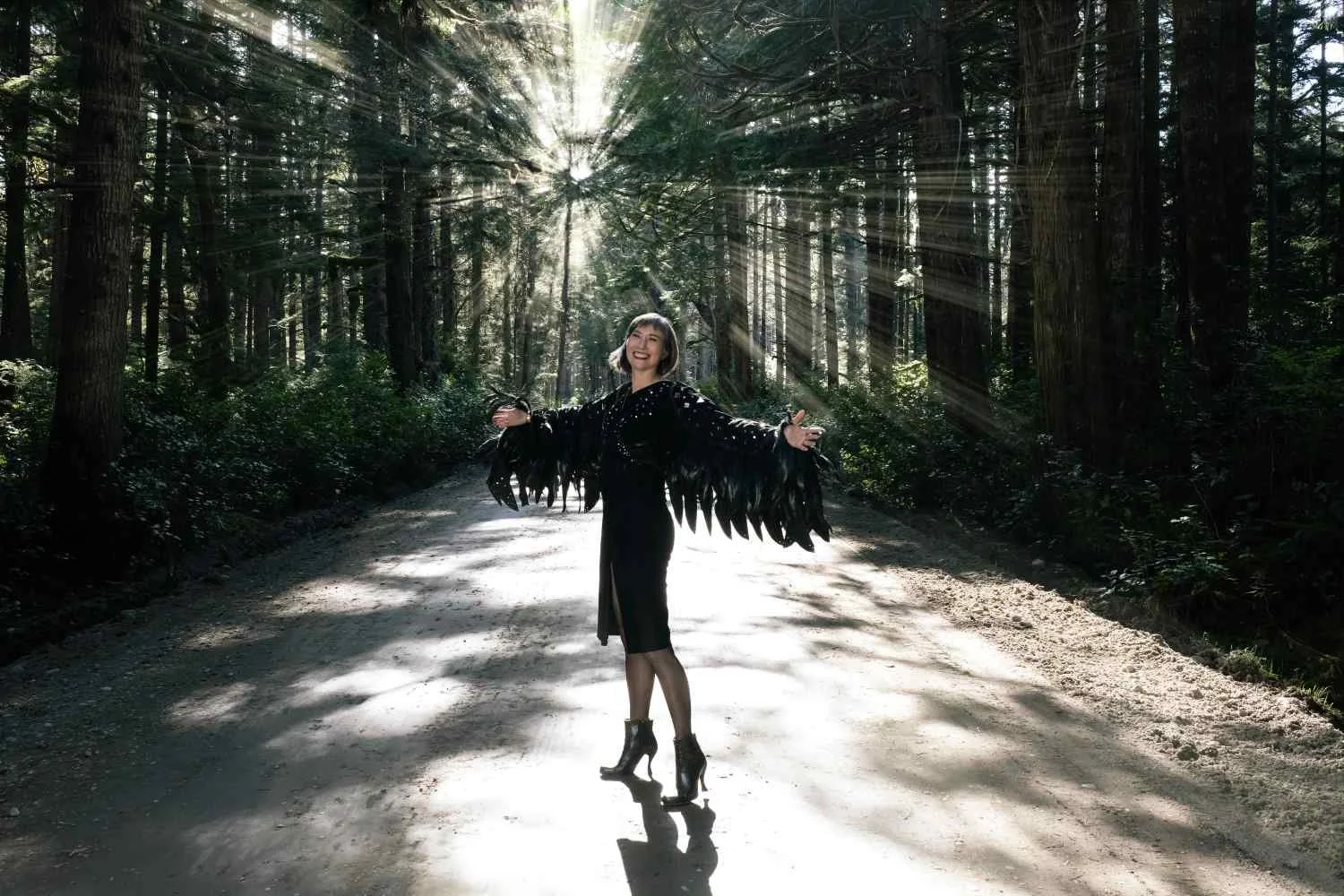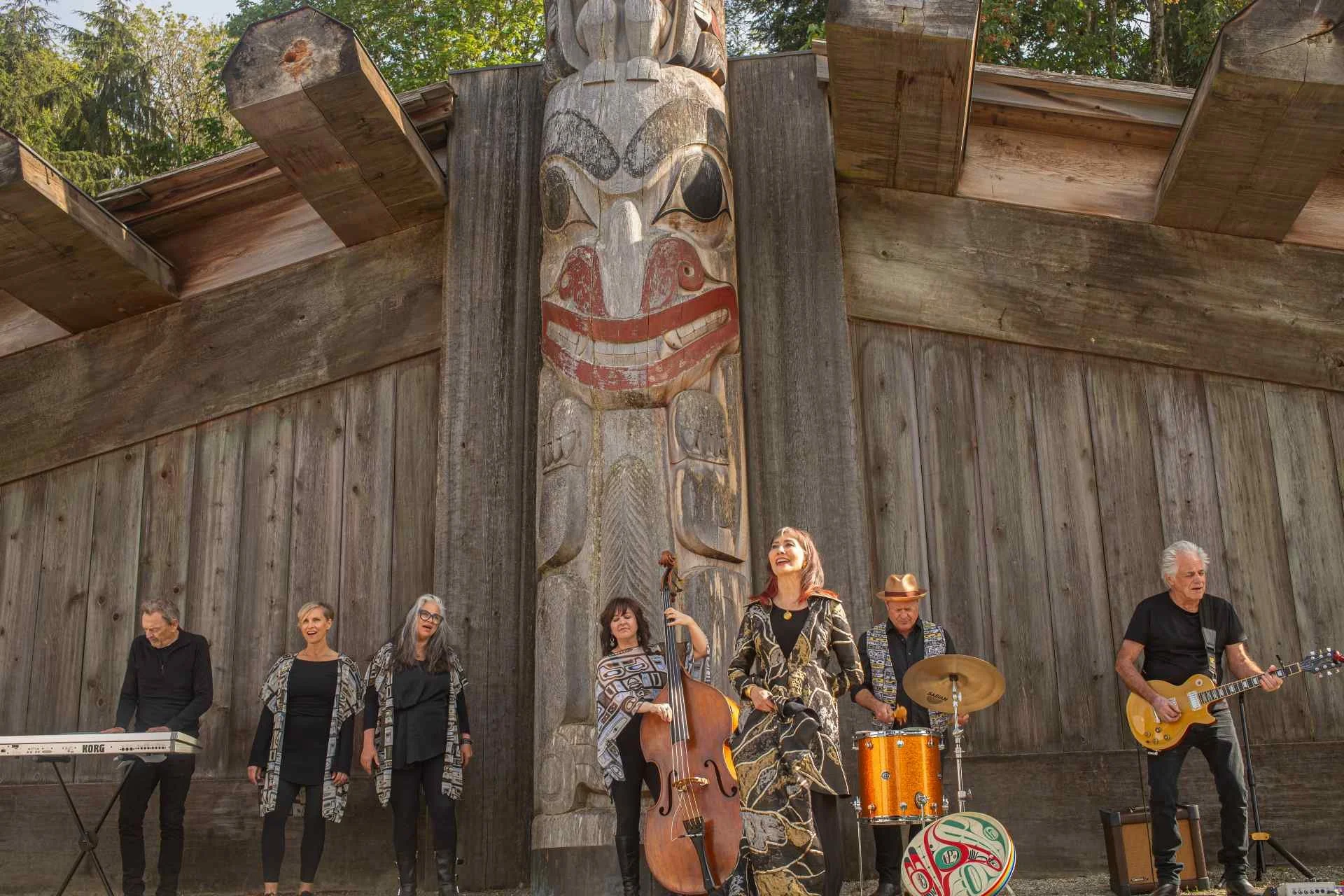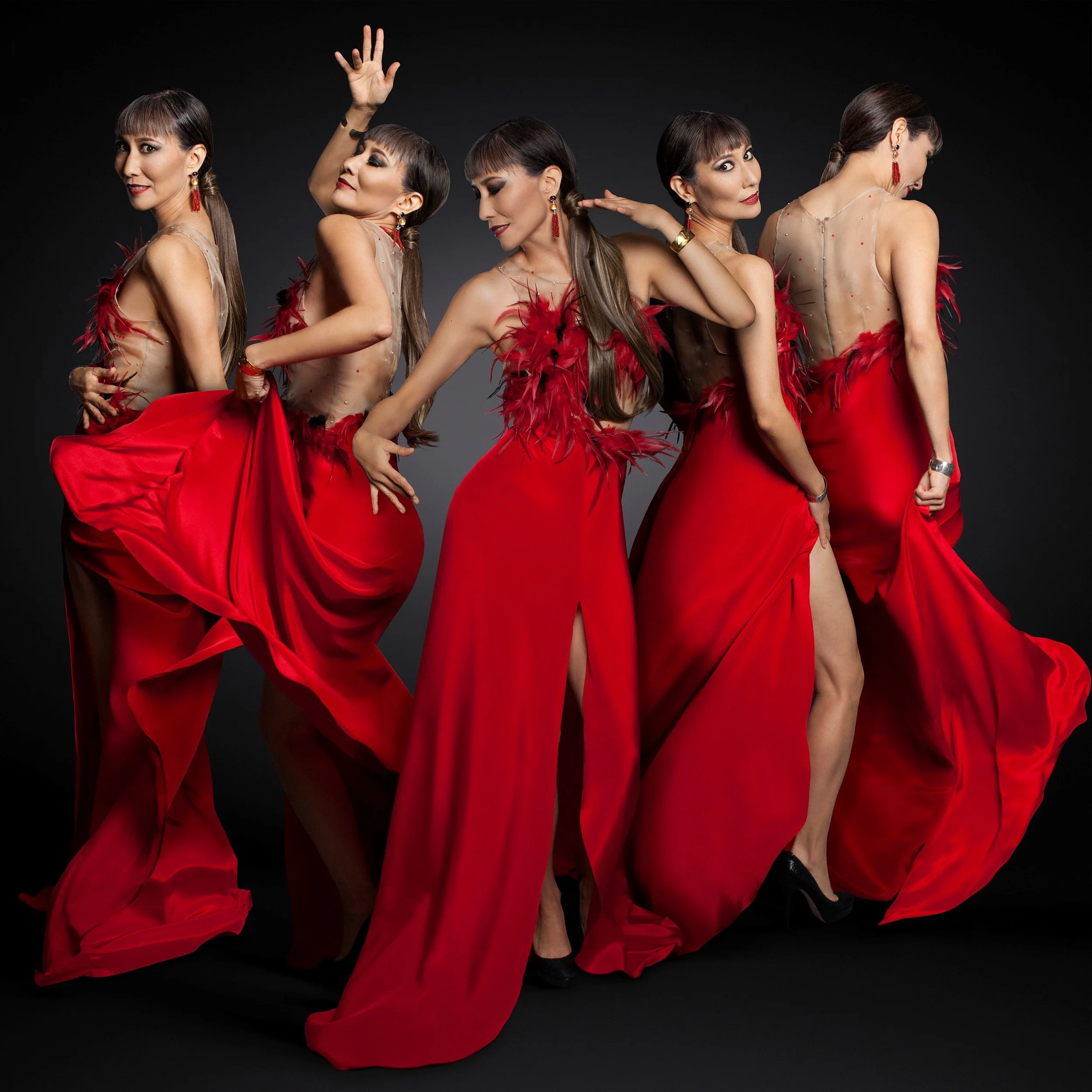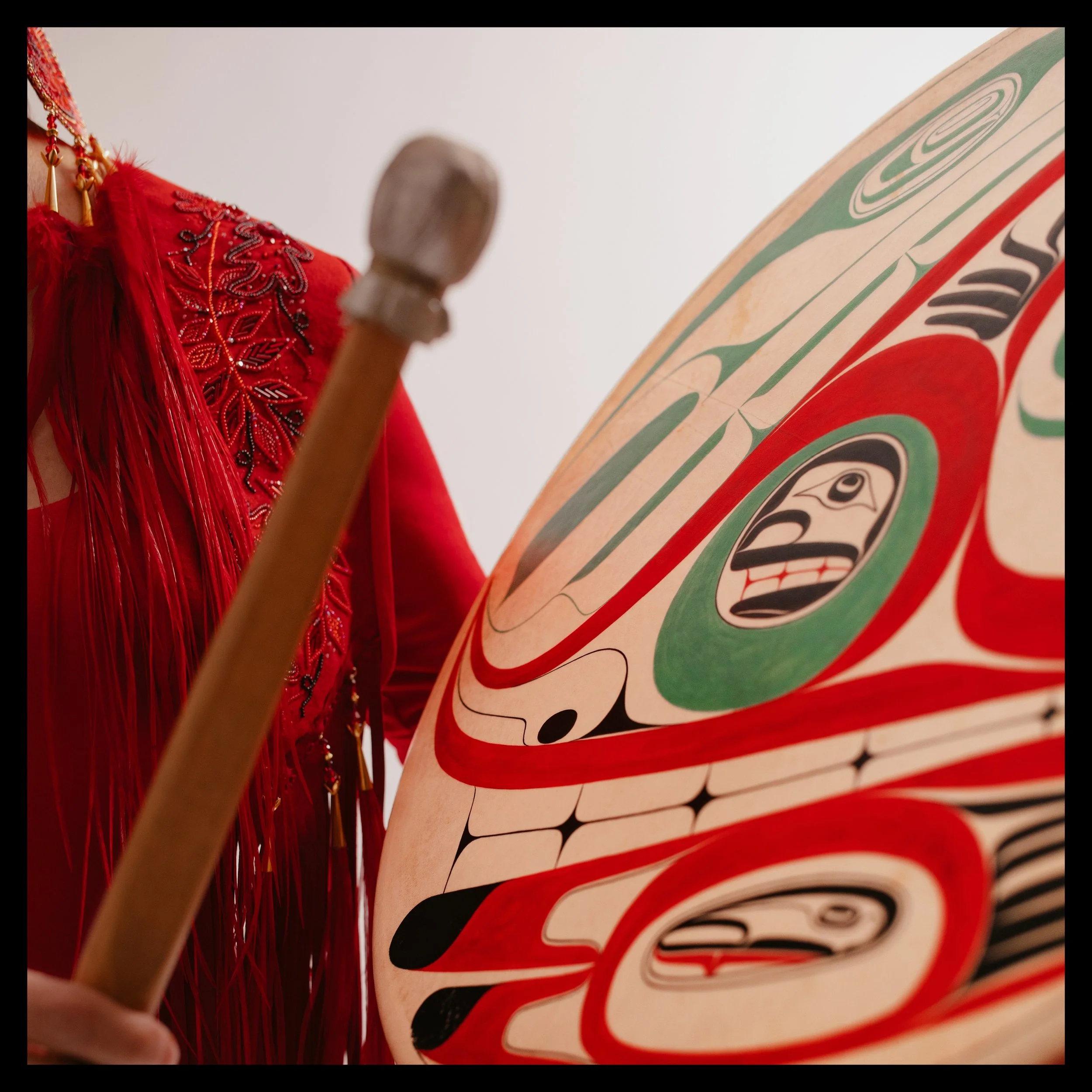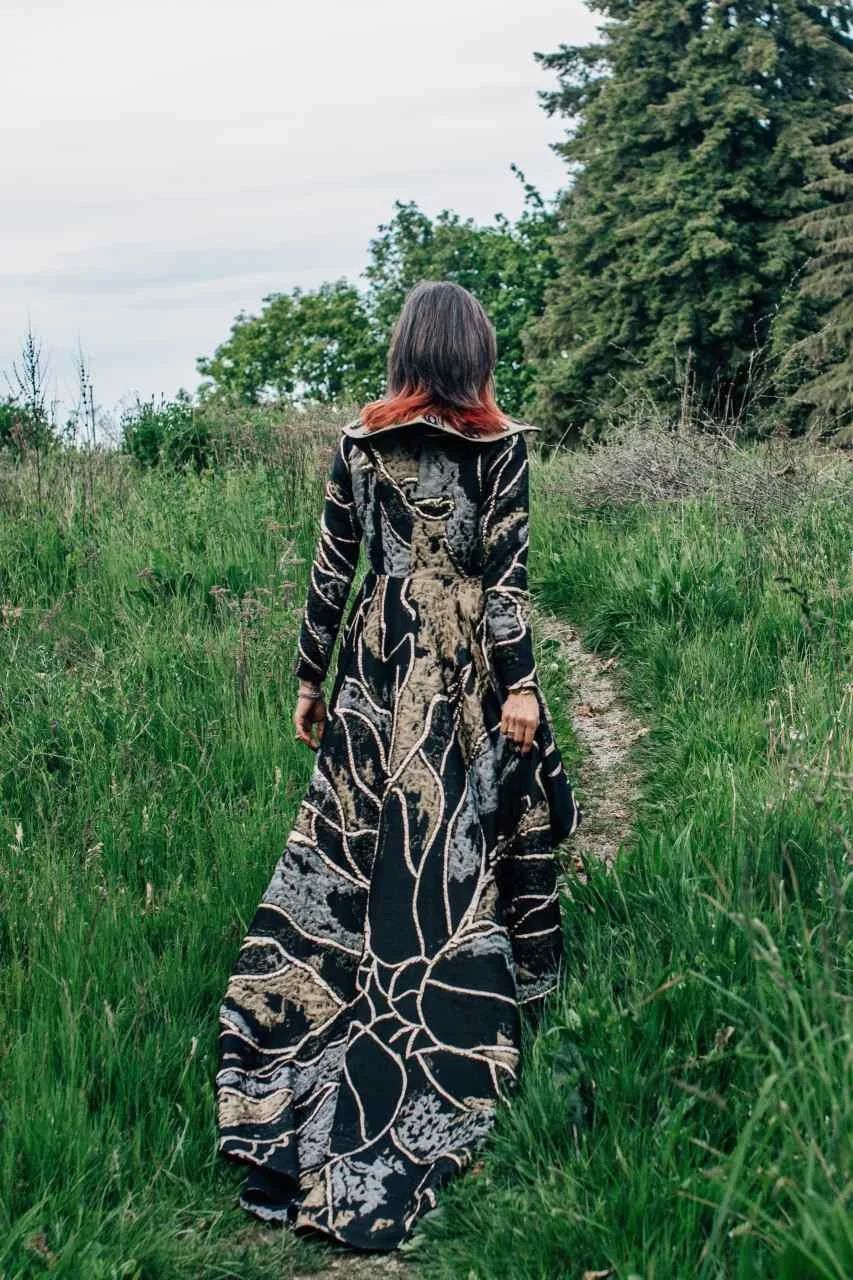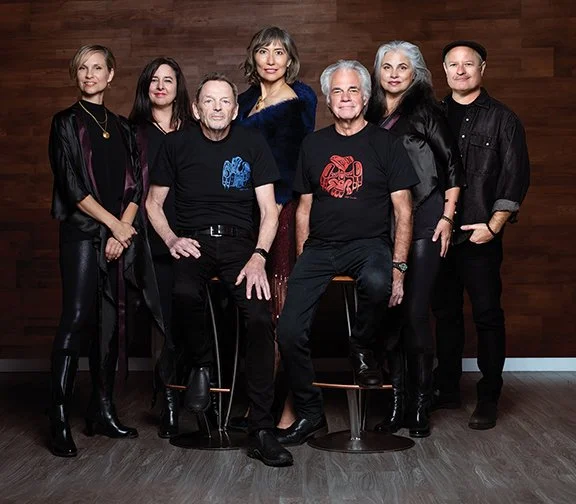Edge of the World
Released August 14, 2025, “Edge of the World” is a collaboration between Terri-Lynn Williams Davidson and and legendary musicians Bill Henderson and Claire Lawrence of the acclaimed rock band Chilliwack. The album reflects the islands of Haida Gwaii, which many people experience as a place of transformations. Haida Gwaii is sometimes referred to as being at the “edge of the world.”
Stream the album here: https://distrokid.com/hyperfollow/terrilynnwilliamsdavidson/edge-of-the-world
1. The World is as Sharp as the Edge of a Knife
TERRI-LYNN WILLIAMS DAVIDSON (2021)
About the Song
This song was inspired by, and bears the name of, a famous Haida proverb. Florence Edenshaw Davidson taught this proverb to Terri-Lynn’s husband, Robert Davidson. The story that inspired this proverb is of a very prideful man who walked along a slightly raised surface and fell to his death. This proverb teaches us that we must strive for balance throughout our lives, including emotions such as pride and humility.
The first verse is the Xaayda Kil (Skidegate Haida) lyrics for the proverb, as translated by the Skidegate Haida Immersion Program. Terri-Lynn composed the melody for this song on a 2021 trip that circumnavigated Cape St James, the southern tip of Haida Gwaii. Cape St James is verdant, rocky, edgy, and primordial. Terri-Lynn’s Xaayda Kil teacher, GwaaGanad Diane Brown graciously hosted this trip with her language students. Terri-Lynn and her students climbed a steep trail to the old lighthouse on Cape St James where they felt the presence of the entirety of Haida Gwaii; it was magical. The second verse describes that walk and was translated by GwaaGanad Diane Brown with the assistance of Kihlgula Gaay.ya, Severn Cullis-Suzuki.
Terri-Lynn later revised the melody of the chorus to reflect the power of Haida Gwaii and first sang it at a memorial Potlatch for her late stepson, Ben Davidson in 2022. There, she gifted it to Ben’s children: Gavin Russ, Dustin Jeanson-Davidson, Jayde Davidson, Juno Davidson and Jasper Davidson. She also gifted it to their cousins to encourage the strengthening of kinship: the children of Leslie Davidson and Tyler Brown, Vanessa and Noel Bellis, Cori Savard and Dwayne Alsop, and the children of Terri-Lynn’s niece, Melanie Russ.
The World is as Sharp as the Edge of a Knife | Robert Davidson 1993
Lyrics
Tllga k’aays-guu- xan, sGaw ga-ang k’ii ga Gam ah-gan-da kyaang.gaay ‘laagang Gin ‘waas-da-gang dllgwii Gas ga He ya-aa hay ee ya
He ya-ah hay-ee-ya
Yaa hee yaa haa hay ee-ya-haa
Yaa hee yaa haa hay ee-ya-haa
Hay-ee-ya haa
Hay-ee ya-ah hay ee ya
He ya-ah hay-ee-ya
He ya-ah hay-ee-ya
k’yuuts’ing guut’alang kaa-hll guu Gid-Gad hll-yaay gyen-uu-uu Xaayda Gwaay.yaay K’aaysguuxan t’aalang king He yaa-aaa hay ee ya
He ya-ah hay-ee-ya
VERSE ONE • CHORUS
The world is as sharp as a knife
If you’re not careful
you will fall off
We walked up a trail
to see Haida Gwaii
the whole we see
2. Ah Hlaan Dii-Ah Lay
TRADITIONAL HAIDA SONG (DATE UNKNOWN)
About the Song
We like to think that Haida Ancestors are dancing to this song
This ancient song was a favourite dance song of Terri-Lynn’s great-grandmother Susan Williams and Henry Young. Sometimes they sang the second verse with an alternate line that is included in the last improvised verse. The Skidegate Haida Dancers danced this song for the first time at the pole raisings at Kay ‘Llnagaay in Skidegate in 2000. Terri-Lynn’s late mother Mabel Williams coached how women dance this song.
More recently, Hltaaxuulang Guud ad K’aajuu (Friends Together Singing) dance it the same way that Mabel had instructed; they describe it as showing off chest tattoos. This traditional dance song holds inherent ‘rock’ energy, that we strove to reflect in the arrangements. Terri-Lynn’s vocalizations in the instrumental were inspired by the free-spirited background vocals of Ella Thompson (Toquaht) accompanying Fred Louie (Ucluelet); they were both Hamatsa and kept alive two Haida songs. Terri-Lynn’s seemingly sensual, but very traditional interjections are a perfect match for our rendition of this song.
Lyrics
Ah he ha he yaay
Ah hay-ay he-yay
Ah he ha he ha
Ah he ha he ha
Ah he ha he ha
Ah hlaan dee ah lay
Ah hay ik su wah
Ah hlaan dee guu-da dee ya
Ah hlaan dee nu was git sla-wahl dii ya
Ahl [Wul] waa sa git so dee ya
Ah he ha he ha
Ah he ha he ha
Ah he ha he ha
REPEAT
3. Kuuhlaans’ Love Song
KUUHLAANS (date unknown)
About the Song
This is an ancient love song composed by a man named Kuuhlaans, an Alaskan Haida. This song survived with, and was a favourite of, Terri-Lynn’s great grandmother, Susan Williams and Henry Young. It is also a favourite song of Terri-Lynn’s husband, Guud San Glans, Robert Davidson who was born in Alaska. The dance group from Terri-Lynn’s youth, the Skidegate Haida Dancers, also used this song as a Paddle Dance. It is a beautiful song that was a joy to record.
* Like many ancient Haida songs, the melody “is the boss” and uses a “song language” different from the spoken language. For instance, Susan and Henry did not pronounce “mind” as it is pronounced is speech (guudang.ngaay) but instead sang it as “guudiingaan.”
Lyrics
Yiy ho-oh ah lee, ya ho-ah ee ah la
Yiy ho ah lee-ee, ya ho-ah ee ah-ah ah-lay
Yiy ho-oh ah lee, ya ho-ah ee-ah la
Yiy ho wah lee-ee yiy ho-ah ee ah-ah ah-lay
Ya ho-oh ee ah la, yiy ho al lee ya-ho-ah ee-ee ah la
Laa gaang gwaay ya, Kaagaay gyaaga kuu juus
Dang Xaad naadga ‘aw daan suudaals guugwa
Dang K’aall giigwa aay ya giit’aad saa-uu
Siiyaahl gaan hlaayi-yi guudang.ngaay giihldaa
[Aah] Kaagaay gyaaga kuujiiwaay
T’aalgyan-dang kil aa-ya guu ‘llga kuujuus
Yiy ho ah lee, ya ho-ah ee ah laa
Yiy ho ah lee, ya ho-ah ee-ee ah laa
REPEAT
It’s alright, dear uncle’s own
When your father’s nephew mentions himself,
does it bother you?
Change your mind*
dear Uncle’s own.
Your voice is more delightful than ever.
4. Dance Band
BILL HENDERSON (2023)
About the Song
Bill composed this song based on Terri-Lynn’s sharing about one of the experiences of her late father, Godfrey (Collinson) Williams, at residential school in Coqualeetza, BC. There a teacher beat him because he didn’t like the way Godfrey walked into the room. Enduring such trauma impacts one throughout their lifetime in unexpected ways. For example, Terri-Lynn often saw her mother, Mabel Williams, dance her husband across the Skidegate Community Hall at dances. Mabel explained that it was because he was too shy to walk across the floor alone. Terri-Lynn remains in awe that although he was so shy, that he overcame his childhood trauma to lead some songs with the Percy Williams Orchestra.
Dance Band reflects the complex settler-colonial history with Indigenous Peoples and contextualizes the generations of Indigenous people who learned settler music, such as Terri-Lynn’s father and grandfathers, her uncle Percy Williams, and many others. Settler music provided an outlet for musical creativity when Haida musical traditions were suppressed through the potlatch prohibitions in Canada. Previous generations such as Terri-Lynn’s maternal great grandmother, Susan Williams, kept alive the legacy of Haida songs. The commonality between Godfrey and Susan is that they both loved to sing, and both inspire Terri-Lynn in her music.
— he could only cross the floor
when my mother took his hand
Lyrics
Father sang the songs
And uncle played along
Everybody danced
Even little ones
Out there on the road
That ran behind the hall
The air was full of our dance band
Strange that he could only cross the floor
When my mother took his hand
Dancing him across to the other shore
And the shelter of his own dance band
Great Grandma used to sing
When we were all alone
She sang about the land
I loved to sing along
She sang about the sea
And the sister cedar tree
But the band never played those songs
Only what we heard on the radio
From so very far away
Made it to the stage of the old dance hall
And the songs my father used to play
5. What a Wonderful World
GEORGE DAVID WEISS & BOB THIELE (1967)
Lyrics
About the Song
This is a classic in Western music, and yet our version of this song is intended to evoke the truly dark and sacred nights of Haida Gwaii, and the restorative and peaceful qualities of those nights.
Lyrics
Kayd k’inhlGahl [hll King], K’ung sGid asing
Dii ad dang Gan iinas.slas hla King
‘Wagen [uu Kiinang] hll gudhlGahl, huu tllga ‘laas
Kuuya kaagan GuhlGahl [hll King], ad yaanang Gaada
Sii.ngaay xaay.ya ‘la, Gaal hlGahl sGaanaGwaay
‘wagen [uu Kiinang] hll gudhlGahl, huu tllga ‘laas
tawla gaa.ngang, Kuuya Kaagan haana
XaaydaGa Stawjuudal Xang gud Xan Kyang.ga
hltaaxulang gud stlaay daw [hll King]
“Gasing.uu dang Giidang”
Dan guhl Xan, dang Ga dii k’uuga
Haawa, Haawa; Haawa, Haawa
REPEAT BRIDGE
Naanuu sGaaygas [hll Gudang], tl’liinas.slas [hll King]
Gina Kwaan ‘la sK’aadGa, sk’yanXanuu
gam Gan dii unsid
‘Wagen [uu Kiinang] hll gudhlGahl, huu tllga ‘laas
Aa.nga, ‘Wagen [uu Kiinang] hll gudhlGahl,
huu tllga ‘laas
Haawa, Haawa; Haawa, Haawa
[I see] trees of green, red roses too
I see them bloom, for me and you
And I think [to myself], what a wonderful world
[I see] skies of blue and clouds of white
The bright blessed day, the dark sacred night
And I think [to myself], what a wonderful world
The colours of the rainbow, so pretty in the sky
Are also on the faces, of people going by
[I see] friends shaking hands, saying
“How do you do?”
They’re really saying, I love you
Thank you
[I (hear) see] babies cryin’, [I watch] them grow
They’ll learn much more than I’ll ever know
And I think [to myself], what a wonderful world
Yes, and I think [to myself],
what a wonderful world
Thank you
6. When The Saints Go Marching In
TRADITIONAL AFRICAN-AMERICAN SPIRITUAL (DATE UNKNOWN)
About the Song
When the Saints Go Marching In was a song often played by the Haida Dance Band, the Percy Williams Orchestra; Terri-Lynn’s uncle Percy Williams played saxophone. The term for “marching in” is the same as that of a genre of traditional Haida songs for when people enter Potlatches in sGaadal, dancing in a line. This song is loved by the community of Skidegate as an anthem for the basketball team, the Skidegate Saints.
Lyrics
Ga dlaaylagaay sGaadalts’ii gen Ga dlaaylagaay sGaadalts’ii gen Dii uu dalang ad naang guuda Dlaaylagaay sGaadalts’ii gen
We are all traveling in the footsteps
Of those that’d come before
And we’ll all be reunited
On that new and sunlit shore
Oh, when the Saints go marching in
Oh, when the Saints go marching in
Oh, how I want to be there on that morning
When the Saints go marching in
And when the sun begins to shine
When the sun begins to shine
Sah ‘Laana, I want to be in that number
When the Saints go marching in
When the Saints go marching in
When the Saints go marching in
Me, I want to be in that number
When the Saints go marching in
When the saxophone sounds its call
When the saxophone sounds its call
Oh, how I want be in that number
When the saxophone sounds its call
Now some say this world of trouble
Is the only world we’ll ever see
But I’m just waiting for that morning
When the new world is revealed
Oh, when the world is revealed
Oh, when the new world is revealed
Sah ‘Laana, I want to be there on that morning
When the new world is revealed
7. Woman’s Dance
TRADITIONAL HAIDA SONG (date unknown)
About the Song
Indigenous Peoples dance to celebrate our community, our traditions, and our laws. We dance the Women’s Dance to celebrate the resilience of the feminine spirit. We recorded this joyful version of the Women’s Dance to celebrate that resilience. This Haida song survived with the Heiltsuk Nation; David Gladstone gifted it back to the Haida Nation in 1978. The Haida use this song as a Women’s Dance Song, sharing in Potlatches and Feasts and inviting audience participation. We invite you to celebrate the growing strength, and innate beauty, power, and joy of women—and dance with us! Terri-Lynn was inspired by the mission of the Ostara Project to showcase Canadian women in jazz given their underrepresentation. Hence this recording with the woman of sGaanaGwa—Terri-Lynn, Jodi Proznick, Saffron Henderson and Camille Henderson—joined by our sound engineer, Julia Graff, on guitar, violin and accordion.
Lyrics
Yay ah-li-ee-ya, yay ah-li-ee-yay ay ah la
Yay ah-li-ee-ya, yay ah li-ee-yay ay ah la
Yay ah li-ee-ya, yay-ay ah li-ee-yay ay ah la
Yay ah li-ee-ya, yay ah li-ee yay ay ah la
Yay ah-li-ee-ya, koohl my-gyea na dii-ii sni-gyea
Yay ah-li-ee-ya, wa-wa ka-hluu ya-ah ni-gyea
Yay ah li-ee-ya, yay-ay ah li-ee-yay ay ah la
Yay ah li-ee-ya, yay ah li-ee yay ay ah la
REPEAT ending with “Kaahliiaayhl– Huuu!”
8. Spirit Song
TRADITIONAL HAIDA SONG (DATE UNKNOWN)
About the Song
There are no oral traditions explaining the use of this song. The welcoming and uplifting nature of this southern Haida song led Terri-Lynn to name it a “Spirit Song” in the Haida Gwaii Singers’ anthologies (2008, 2009). Since then, it has become a very popular song in the Haida Nation, sometimes used as a prayer or power song. Our rendition of this song seeks to connect the audience to the restorative, peaceful, and ethereal nature of Haida Gwaii.
Lyrics
Ya-ah ah hi-you-way
He-ee ya la
Hi you wa-ah la hay
Ya-ah hi you way
Ya ha ha hay
Aay, ya hay you-who, hay you who
Ya ha ha hay
9. We’re Still Alive
TERRI-LYNN WILLIAMS-DAVIDSON (2022)
About the Song
Terri-Lynn composed this song to honour the Haida people who live in Alaska, including her husband Robert Davidson who was born in Hydaburg, Alaska. It relays oral traditions about how the Haida migrated to Alaska from northern Haida Gwaii. It is in northern Xaad Kil (Masset Haida), translated by Dr. JasKwaan Bedard.
K’iis gwáay t’álang ‘isdáalgaan
t’álang ‘isdáalgaan
‘Waa!
Xaadla gwáay iitl’ kuyáa-adang
ku-yáa-adang!
‘Waa!
Ah hay ee yay
Ah hay ee yay
Ah hay ee yay, ah hay
Ah hay ee yay ah hay
Ah hay ee yay
Gin ‘wáadluuwaan gud áhl ‘iswaang
gud ahl ‘iswaang!
‘Waa!
hawáan iitl’ ḵ’iiganii xaadáagang
k’iiganii xaadáagang!
‘Waa!
CHORUS
Hawáan uu iitl’ xíinang.áang Hawáan uu iitl’
xíinang.áang! Hay, hay, hay, ‘Waa! ‘Waa! ‘Waa!
Yah-ah hay ee yay
xíinang.áang! Hay, hay, hay, ‘Waa! ‘Waa! ‘Waa!
Yah-ah hay ee yay
xíinang.áang! Hay, hay, hay, ‘Waa! ‘Waa! ‘Waa!
Yah-ah hay ee yay
REPEATED CHORUS
Mountain Goat, Grizzly Bear, Rainbow
Drum | Robert Davidson 1996
Lyrics
We walked from Langara Island
We walked
{Expression of extreme awe}
We love Haida Gwaii
Love!
We are all interconnected
Interconnected!
We’re still K’iigani Haida
K’iigani Haida!
We’re still alive!
10. War Song
TRADITIONAL HAIDA SONG (DATE UNKNOWN)
About the Song
The Haida Gwaii Singers Society released this song with a powerful performance from Guujaaw. This song does not have Haida lyrics, although Terri–Lynn hears and sings the Xaad kil (Northern Haida) words for “Halibut” and “Cedar.” She selected this song not to champion war, but to recognize the hereditary responsibilities and relationships that Indigenous Peoples have with ancestral territories, and the Beings that inhabit those lands, waters, and airspaces. The astonishing impacts of colonial displacement, dispossession, and industrialization of forests and oceans motivated the Haida Nation to protect the lands and waters of Haida Gwaii. As a result of the Haida Nation’s success upholding hereditary responsibilities to Haida Gwaii, Haida Gwaii remains to sustain Haida culture and our collective future. Terri–Lynn dedicates this song to the Beings that endured those colonial assaults and expresses love for the Beings of Haida Gwaii, including the Halibut People and Cedar Sisters. It reflects the growing strength of Indigenous relationships with the land and oceans.
Lyrics
Ah hi yo, hi you wah la ha; ha ha-ha hi, ee ya-ah; ah-hi wee-ay
I yo ho, hi yo-ho, wee-ee-yay, ah-ha la
I yo ho, I yo-ho, ho wee-yay
I you wa-ah-la, I you wa-la, I you weay, ah hi, wee
Ah hi ya, I you wah laa-ha, ha-ha-hay; ah-hi ee-ee ya la
Ah hi you, hi you ah la-ah, ah-ah hi ee-ya-ah; ah hi wee
Xa-gu-uu, xa gu-uu huu, wee-yaay, ah-ah-la
Ah guu-uu, hah-guu-uu, huu wee-yay
Ts’uuwee nee-na, ts’uuwee nee na, ts’uuwee na, ah hi, weee

